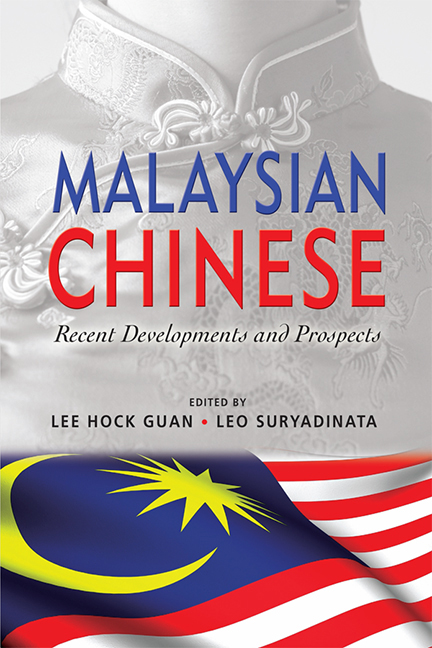Book contents
- Frontmatter
- Contents
- Preface
- Contributors
- Glossary
- Introduction
- 1 Malaysia: Ethnicity, Nationalism, and Nation Building
- 2 Being Muslim and Chinese in Malaysia
- 3 Quo Vadis: The Chinese in Malaysia
- 4 At a Crossroads: Malaysia's Coalition Politics and Chinese-based Political Parties
- 5 The End of Chinese Malaysians’ Political Division? The March 8 Political Tsunami and Chinese Politics in Penang, Selangor, and Perak
- 6 Forced to the Periphery: Recent Chinese Politics in East Malaysia
- 7 The New Malaysian Economic Agenda: Some Preliminary Observations
- 8 The Old And New Malaysian Chinese Language Press, with Special Reference to the 12th General Election
- 9 Education of the Chinese in Malaysia
- Index
8 - The Old And New Malaysian Chinese Language Press, with Special Reference to the 12th General Election
Published online by Cambridge University Press: 21 October 2015
- Frontmatter
- Contents
- Preface
- Contributors
- Glossary
- Introduction
- 1 Malaysia: Ethnicity, Nationalism, and Nation Building
- 2 Being Muslim and Chinese in Malaysia
- 3 Quo Vadis: The Chinese in Malaysia
- 4 At a Crossroads: Malaysia's Coalition Politics and Chinese-based Political Parties
- 5 The End of Chinese Malaysians’ Political Division? The March 8 Political Tsunami and Chinese Politics in Penang, Selangor, and Perak
- 6 Forced to the Periphery: Recent Chinese Politics in East Malaysia
- 7 The New Malaysian Economic Agenda: Some Preliminary Observations
- 8 The Old And New Malaysian Chinese Language Press, with Special Reference to the 12th General Election
- 9 Education of the Chinese in Malaysia
- Index
Summary
INTRODUCTION
As mentioned by several authors of this book, one of the factors that contributed to the unexpected opposition win during the 12th Malaysian general election was the role of the mass media (Weiss 2008; Welsh 2008). The new communication technology, through online news sites, sociopolitical blogs, and emails, is said to have played a significant role in disseminating plural and dissenting views in a highly controlled media environment. Although the new media made their beginning during the 1999 general election, their impact was most felt during the 2008 general election. Then Deputy Prime Minister Datuk Seri Najib Abdul Razak acknowledged that the new communication technology was “one of the factors that led [to] us having a worse than expected performance” (New Straits Times, 28 May 2008). In an election post-mortem, Welsh said that people were disillusioned with the usual biased reporting of the mainstream media, preferring instead to search the Internet for alternative views (Malaysiakini, 12 March 2008). This chapter will compare the news coverage of the 12th general election by both the Chinese mainstream and online press to show the inclusion and exclusion of certain groups and individuals, reflecting the power structures within which the media operate. To contextualize the study, the chapter will analyse the Malaysian Chinese newspapers taking into account increasing state control and media concentration as well as the emergence of online news websites in response to the repressive media situation and social demand for greater political openness.
DIRECT STATE INTERVENTION
After Independence, two events that have had major impacts on the contemporary structure of the mass media are the separation of Singapore from Malaysia, and the May 13 riots in 1969. In 1965, with the separation of Singapore from Malaysia, the Malaysian authorities decreed that all foreign publications had to obtain prior permission before being circulated in Malaysia. This cumbersome arrangement affected all the major newspapers that were based in Singapore, namely, the Straits Times, Berita Harian, Nanyang Siang Pau, Sin Chew Jit Poh, and Shin Min Daily. These papers had no choice but to set up new entities in Malaysia, a move which laid the groundwork for direct state control of the newspapers.
- Type
- Chapter
- Information
- Malaysian ChineseRecent Developments and Prospects, pp. 144 - 165Publisher: ISEAS–Yusof Ishak InstitutePrint publication year: 2011



